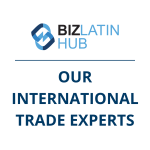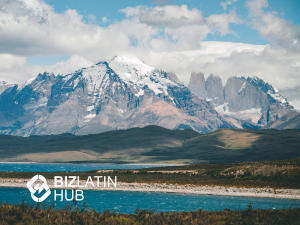Trade agreements in Bolivia are of paramount importance to the country. The nation’s economy strongly depends on international trade. As a member of MERCOSUR, it can take advantage of the common market within the southern cone of South America.
Between 2013-2018, the country grew at an average annual rate of 5.1%. However, structural problems have caused issues in its trade and commercial environment. The country continues to attract business from foreign investors considering company formation in Bolivia. The USA in particular has looked for trade agreements in Bolivia.
As a company looking to expand into Latin America, consider the opportunities generated by trade agreements in Bolivia. Your business operating within the country may also want to access important consumer markets abroad. As experts in Latin America, we can help you at every stage of the process, across the region.
Trade agreements in Bolivia: an overview
Bolivia is a member of various trade agreements that help to stimulate the business and economic growth of the country.
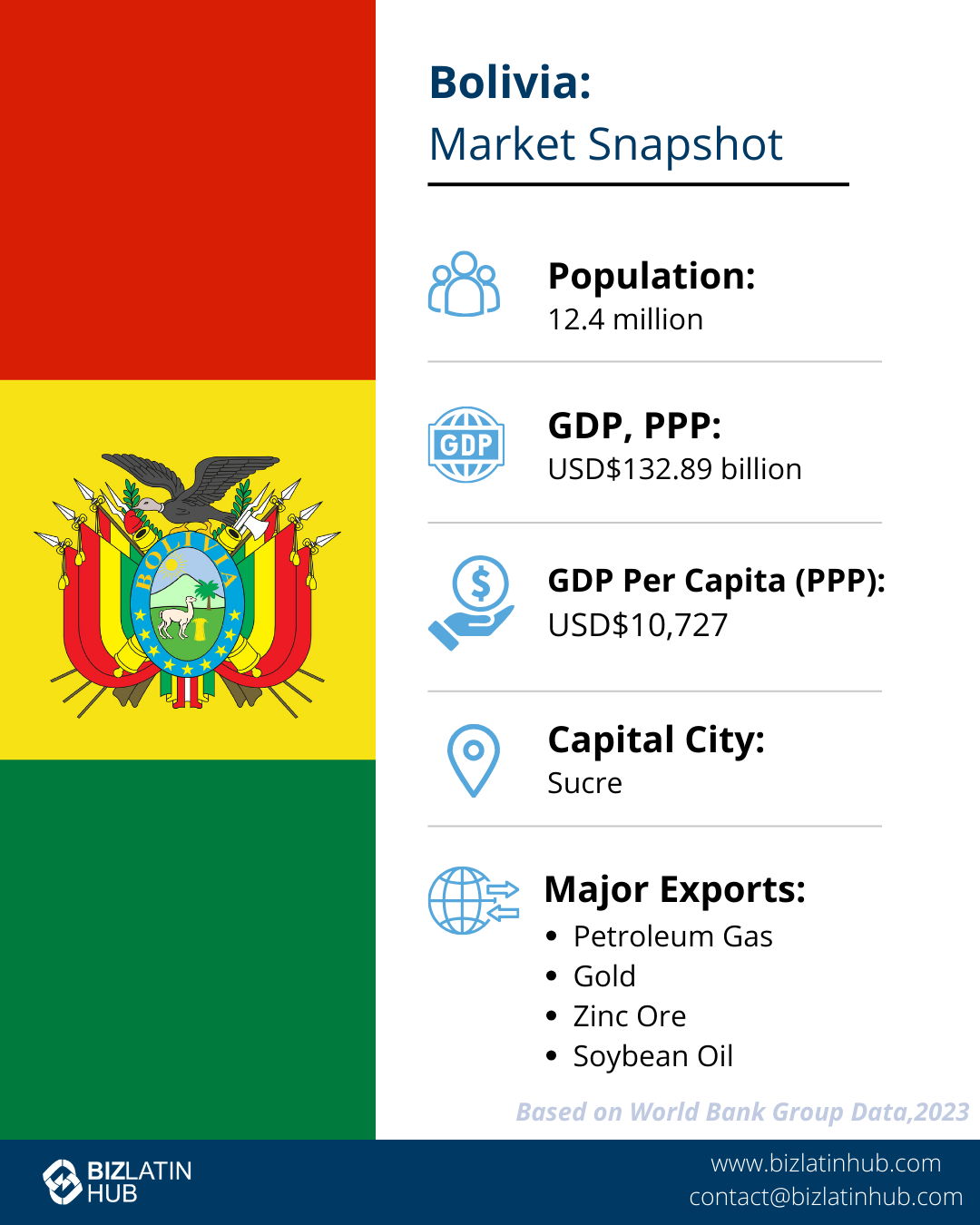
World Trade Organization
The World Trade Organization (WTO) is the biggest in the world. Bolivia has been a member of the WTO since it was created in January 1995. The World Trade Organization deals with the rules and organization of commerce between countries. The goal of the WTO is to help countries work with each other to grow the world economy.
The WTO will lower trade costs excessively for developing countries like Bolivia. This rule in combination with the growth of the country has supported Bolivia’s international trade activity.
The most recent WTO trade policy review of Bolivia was in 2017. The main changes made in the review were made by Bolivia to its investment regime, including the nationalization of enterprises allowed by the government. Moreover, general tariffs were increased from 8.2% in 2005 to 11.1% in 2017.
Is Bolivia part of Mercosur?
The regional integration process of Mercosur was founded in 1991 by Argentina, Brazil, Paraguay, and Uruguay. In later phases, Mercosur incorporated Bolivia, Venezuela, Colombia, Chile, Ecuador, Peru, Guyana, and Suriname. The Mercosur trade bloc is an alliance to create a free trade environment between member countries.
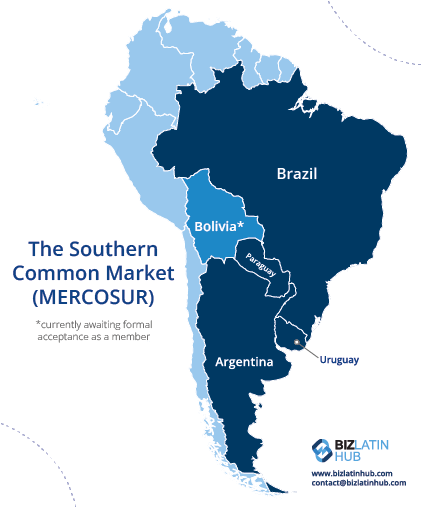
The reason for creating this alliance was to stimulate investments, production, and trade between the members of the alliance. In July 2015, Bolivia was fully admitted as a member of Mercosur.
The citizens of Mercosur countries have the right to free movement, residence, and employment throughout the bloc and in the five associated countries.
Citizens still have the privilege of free transport of goods, services and money, as well as equality of rights, harmonization of social security systems and labor laws. It also works alongside other trade agreements in Bolivia.
The ease of doing business in Bolivia has significantly improved since the introduction of Mercosur. Moreover, this empowers these countries to gain preferential market access and expand their international trade reach.
One of the biggest advantages is that the associated countries (Colombia, Chile, Ecuador, Peru, Guyana, Suriname, and Bolivia) obtain valuable tariff privileges. Member countries are automatically excluded from import or export tariffs.
The Andean Community of Nations
On May 26, 1969, five South American countries (Bolivia, Colombia, Chile, Ecuador, and Peru) signed the Cartagena Agreement, with the purpose of improving the standard of living of its population through integration and economic and social corporation. The Cartagena Agreement eventually resulted in creating the Andean Community of Nations (CAN).
The Andean Community of Nations is a regional bloc made up of these five countries that intends to achieve a comprehensive, balanced and developed environment, through greater regional integration. It is now one of the key trade agreements in Bolivia.
In a collaboration agreement with Mercosur, the Andean Community added four new partner members: Brazil, Paraguay, Argentina, and Uruguay. These four Mercosur members were granted associate membership by the Andean Council of Foreign Ministers on July 7, 2005.
Bolivia’s key trading markets
Bolivia’s resources exports to every corner of the globe and its reserves of lithium chloride are the largest in the world. Bolivia engages in a high level of regional trade, 4.4 billion US dollars (43.7% of total imports) were bought from Latin American and Caribbean countries (excluding Mexico).
Trade agreements in Bolivia are therefore highly valuable, as they reduce tariffs and offer other privileges for the country to support the majority of its international export and import activity.
In 2018, Bolivia’s main export partners were Brazil (19.2% of Bolivian exports), Argentina (16%) and India (8.1%). Its main export products include petroleum gas (33.4%), zinc ores and concentrates (17.2%), gold (13.1%), precious metal ores and concentrates (7.2%), and oil-cake (4.5%).
In 2016, statistics showed Bolivia’s main import partners were China (19.9% of imports), Brazil (17.5%) and Argentina (10.5%). Its main import products included petroleum oils (10%), motor vehicles (7.9%), insecticides (2.7%), and iron bars and rods (2.2%).
What Opportunities are there for commerce and trade in Bolivia?
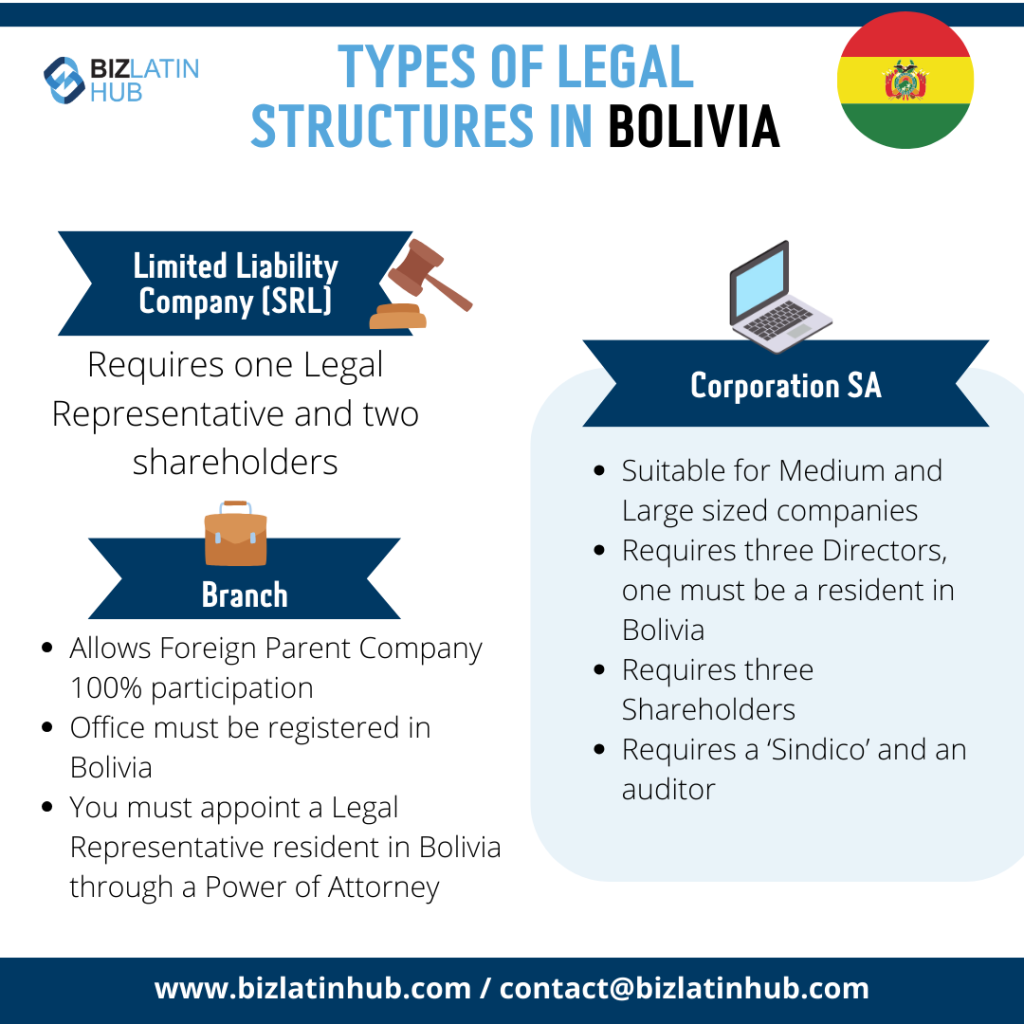
Natural gas
The main product exported by Bolivia is natural gas, with profits of around USD$6bn. Bolivia was the first exporter of natural gas in South America. Across the continent, Bolivia is the fourth-largest exporter of gas, only after the United States, Canada, and Trinidad and Tobago. Worldwide, Bolivia is ranked as the seventeenth-largest exporter of natural gas.
Gold
The second-largest export product in Bolivia is gold. Approximately 95% of Bolivia’s gold is being exported to the United States, 4% to Switzerland and 1% to Italy. The country is the fifth largest exporter of gold worldwide thanks to the trade agreements in Bolivia.
Zinc
The third key export for Bolivia is zinc, with Asia being the greatest regional consumer of Bolivian zinc. Bolivia is the second-largest producer of zinc in Latin America, and the seventh-largest producer globally.
In terms of technology, Bolivia does lag behind other regional and global traders. There are many possibilities like connecting the zinc, gold or natural gas operations through mining or agriculture technology.
Bolivia holds at least a quarter of the world’s known lithium reserves, but technical, political and economic factors are currently holding them back from exporting this successfully. Companies such as Lilac solutions, a mining technology company, are aiming to improve the efficiency of winning lithium extraction in Bolivia.
The processing and development of mines in Bolivia are far behind other strong mining economies. Many opportunities may, therefore, lie ahead for foreign companies to start a new mining export project in Bolivia.
FAQs on trade agreements in Bolivia
In July 2015, Bolivia was fully admitted as a member of Mercosur.
On May 26, 1969, five South American countries (Bolivia, Colombia, Chile, Ecuador, and Peru) signed the Cartagena Agreement, with the purpose of improving the standard of living of its population through integration and economic and social corporation. The Cartagena Agreement eventually resulted in creating the Andean Community of Nations (CAN).
Bolivia has been a member of the WTO since it was created in January 1995. The World Trade Organization deals with the rules and organization of commerce between countries. The goal of the WTO is to help countries work with each other to grow the world economy.
The main product exported by Bolivia is natural gas, with profits of around USD$6bn. Bolivia was the first exporter of natural gas in South America. Across the continent, Bolivia is the fourth-largest exporter of gas, only after the United States, Canada, and Trinidad and Tobago. Worldwide, Bolivia is ranked as the seventeenth-largest exporter of natural gas.
Yes, this is permitted under local law, though you will need a local resident as a legal representative.
Partner with Biz Latin Hub to take advantage of trade agreements in Bolivia
There are several valuable trade agreements in Bolivia that generate preferential trade conditions for exporters and importers operating within the country and across the region. However, trade regulations in Bolivia require careful attention from prospective traders.
Foreign executives that are considering utilizing the trade agreements in Bolivia to do business should work with experienced, leading market entry and trade law specialists to start their expansion successfully.
At Biz Latin Hub, our trade law specialists in Latin America can give the best advice on trade regulations in the region to facilitate your market entry and exporting/importing operations efficiently, professionally, and in full compliance with the law. Contact us now to discuss your Bolivian trade opportunity.
Learn more about our team and expert authors.


